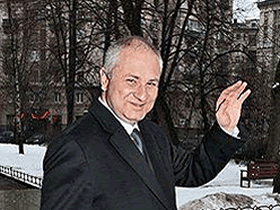A naive killer By Magomed Toriyev, special to Prague Watchdog
Politics played as a game seldom becomes a crucial political act, even if it looks like one. Even if the game involves a crime as serious as the murder of a politician.
The numerous statements, the open letters to the presidents of Russia and Ingushetia, the whole of the seething pseudo-political operation that has been launched by Ibrahim Yevloyev, mainly on the Internet, will not allow him to wipe away the stigma of being the murderer of Magomed Yevloyev and attain at least a minimum of political status. Ibrahim Yevloyev killed a man who had only just begun to establish the basic rules of the game that he is trying to play.
The political process in Russia does not lack killers, and those killers are indeed no ordinary perpetrators. In Russia there is no room for the provincial loser who has failed to gain protection from his "masters". Ingushetia, on the other hand, lacks a natural political process as such. Instead, there is a changeable, artificial little world of machinations and conflicting interests, opposing groups and clans, and a kaleidoscope of gossip, rumours, and blood-feuds. Because of the defects of understanding and vision that are typical of someone with his cultural background, the Ingush politician may sincerely believe himself to be authentic.
But with a zeal that deserves to be put to better use, Ibrahim Yevloyev is trying to pull the wool over the eyes of his compatriots and of foreign observers in a vain attempt to hide behind the reputation of a professional politician, to carve out a space for himself – one which, albeit negative, rests on a popularity that is designed to be his indulgence and protection.
Ibrahim Yevloyev and his supporters (or cronies) are able to buy and intimidate judges and prosecutors. The sentence imposed on him by the Ingush Supreme Court of Ingushetia looks like a mockery of justice. But in a world without politics, that is not important. In a country with a developed political system the investigation of the murder case would focus its attention on those who ordered the killing, and on the responsibility of the officials who gave the order. This might do something to alleviate the plight of the actual perpetrator, removing from him some of the blame, at least in the eyes of his countrymen. But in a reality where politics does not exist, the formal rules do not work, and so gradually the role of law and political control comes to be played by informal justice. Unfortunately, Ingush tradition prescribes that only the direct perpetrator of a crime shall be considered responsible for it, while those who ordered the misdeed are not held to account.
The Ingush judge or prosecutor may make it look as though he is sincerely convinced that the killing was the result of "negligence". But like the other 480,000 citizens of Ingushetia he knows that in this republic the shooting of an unarmed arrested suspect is never a random event.
Ibrahim Yevloyev is an Ingush, and all his efforts to evade the mountain law by which the Ingush have lived for a thousand years will ultimately bring no benefit either to himself or to his relatives. He is trying to make a formal apology to the victim’s family, but he knows full well that his chances of this being accepted by them are almost nil. In Ingushetia it is practically impossible to obtain forgiveness for blood that has been deliberately spilled, whether one seeks to obtain it by money or by the intervention of tribal elders. Often the process of reconciliation can drag on for decades.
Ingush traditional law [adat] prescribes no period of limitation for Magomed Yevloyev’s father and brothers in their quest for revenge. Today they seek justice in the courts, for the poor father does not want to risk the lives of his children, but Ibrahim Yevloyev has not been forgiven. Retribution may strike the offender at any time, even twenty or forty years from now.
While it is possible to criticise this custom for being unfair – to many people, including myself, it looks like a relic of the past and is no guarantee of just retribution – there is no reason to believe that will be discontinued any time soon.
In the past, people in the North Caucasus assumed that the perpetrator [krovnik] and his family would have left his native village, and even sometimes the Caucasus itself, because of the shame and disgrace that might expose the lives of their male kinsfolk to risk. In Ingush history, some krovniki let their hair and fingernails grow or cut off their beards as they waited either for pardon or for retribution. All of these outward signs of grief were intended to show the family of the deceased that the offender had repented and sought reconciliation. Alas, today the situation is different.
All of Ibrahim Yevloyev’s present activity merely bears witness to his insatiable desire to live, and live long. But it will take a miracle for him to be pardoned. And miracles, as we know, do not happen.
Photo: hroniki.info. (Translation by DM) © 2010 Prague Watchdog (see Reprint info). (P,DM) RELATED ARTICLES:
· Farewell, Magomed! (PW, 1.9.2010)
DISCUSSION FORUM
|

